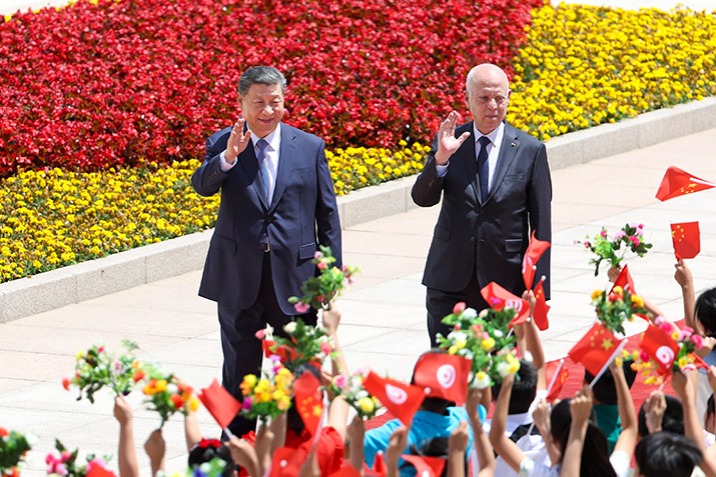Travel boon for tour guides

Foreign-language tour guides are in huge demand on the Chinese mainland, driven by the influx of overseas tourists enjoying mutual visa-free policies between China and a host of other countries. Zhou Mo reports from Shenzhen.

Liu Dandan guided two groups of travelers from Thailand on a tour of Guangdong cities in the Guangdong-Hong Kong-Macao Greater Bay Area recently, displaying her proficiency in the Thai language that she mastered at university.
As well as hosting tourists, the part-time tour guide from Shenzhen has also served as an interpreter for business delegations from the country popularly known as the "Land of Smiles".
"You can feel that international business in China is growing by leaps and bounds. Tourists are here for sightseeing and shopping and businesspeople from overseas are here to make money," Liu said.
She used to work for an international trading company but was forced to quit last year as business dwindled amid the global economic slowdown. "The surge in international travel following the pandemic is a silver lining for people like me," she said.
Thanks to the implementation of China's visa-free travel policies, the number of foreign visitors to Shenzhen has soared, making roughly 220,000 entry and exit trips via the Shenzhen Bay checkpoint between the start of the year and April 15, a three-fold increase from the same period last year.
About 24,000 of those made the entry under the visa-free policy, accounting for a fifth of the total number of inbound foreign travelers. Malaysia, Singapore and France were the top three sources of such travelers.
The influx of overseas travelers has boosted demand for foreign-language-speaking tour guides, especially if they speak minority languages or those other than English.
According to media reports, there were about 600,000 tour guides on the Chinese mainland before COVID-19 reared its head in early 2020 - some 10 percent of them being foreign-language-speaking tour guides. Most of them were English-speaking, with those proficient in minority languages accounting for less than 3 percent.
The pandemic, which paralyzed international travel and dealt a heavy blow to tourism, sparked an exodus of workers in the industry, causing an acute shortage of talent.
The demand for minority language-speaking tour guides has exceeded that in 2019, according to He Tao, executive director and secretary-general of the Shenzhen Tour Guide Association. Currently, Shenzhen has over 800 registered foreign-language tour guides, mostly working part-time, and the number of people who have registered to be trained for the role has gone up three-fold in a year.
According to Liu, the daily income of foreign-language-speaking tour guides ranges from 500 yuan ($69) to more than 1,000 yuan - 30 percent higher than those offering services in Chinese.
"A number of people have consulted me on social media platform Xiaohongshu about how to become a foreign-language-speaking tour guide. You can see that interest is growing, but it will take time to solve the labor shortage problem as the profession calls for not just language proficiency, but also cultural and historical knowledge, as well as experience in the industry," she said.
New policy boosts tourism
The number of foreign visitors to China jumped more than three-fold in the first quarter of 2024 from the same period a year ago, statistics from the National Immigration Administration showed. Nearly 2 million foreign travelers entered the country visa-free during the period - up a whopping 266.1 percent year-on-year.
The surge demonstrates the positive effect of the country's opening-up that aims to foster international collaboration and promote people-to-people exchanges. The mainland has introduced visa exemption measures for a string of countries since the second half of last year. Nationals of Singapore and Brunei are entitled to a 15-day visa-free entry as of July 26 last year. Citizens of France, Germany, Italy, the Netherlands, Spain and Malaysia are allowed to enter China for business, tourism, visiting relatives and friends, and transit without a visa, along with six European countries - Switzerland, Ireland, Hungary, Austria, Belgium and Luxembourg. Mutual visa requirements have also been waived for Chinese mainland tourists in Thailand and Thai nationals visiting China.
Hotel bookings by foreign tourists in the Greater Bay Area have risen by more than 30 percent since the visa requirement was lifted, while flight and high-speed train bookings have climbed by 44 percent and 29 percent respectively, according to mainland online travel agency Trip.com Group.
The boom in demand for tour guides in Shenzhen is expected to benefit their counterparts from the Hong Kong and Macao SARs. Shenzhen's Qianhai - a special economic zone featuring in-depth cooperation between Shenzhen and Hong Kong - has allowed Hong Kong and Macao tour guides to practice there without having to pass mainland professional tests. They need to register but can provide tourism services in Qianhai once they have undergone training and obtained approval.
"Most Hong Kong tour guides are fluent in English. Therefore, mainland tour guides could be trained at Hong Kong-based educational institutions, such as colleges and universities," said Song Haiyan, associate dean (research) and chair professor at the School of Hotel and Tourism Management, the Hong Kong Polytechnic University.
Highlighting the importance of Hong Kong and Shenzhen working together to promote tourism, he said: "Given the complementary advantages of both cities, collaboration is very important. The two cities can jointly promote their tourism products and services."
Lei Man-hou, president of the Macao Tourist Guides Union, said while the number of European visitors to Macao has increased significantly, the SAR has only a handful of Spanish-speaking tour guides aged from 60 to 70, along with five to six others who can speak Portuguese.
Due to the imbalance between supply and demand for minority language-speaking tour guides, English-speaking professionals have been used to fill the gap. However, that does not suit every international tourist, Lei said.
He suggested that the Macao SAR government encourage tour guides to attend language courses by offering incentives to strengthen their ability and attract more young people to the profession.
- Drone captures rare moment: Porpoises frolic at sea
- China sets up comprehensive environmental judicial system
- China concludes 232,000 first-instance environment, resources cases in 2023
- May temperatures rise across China
- Zhangwu turns desert into pine forests
- Region plagued by sandstorms becomes key in desertification fight


































